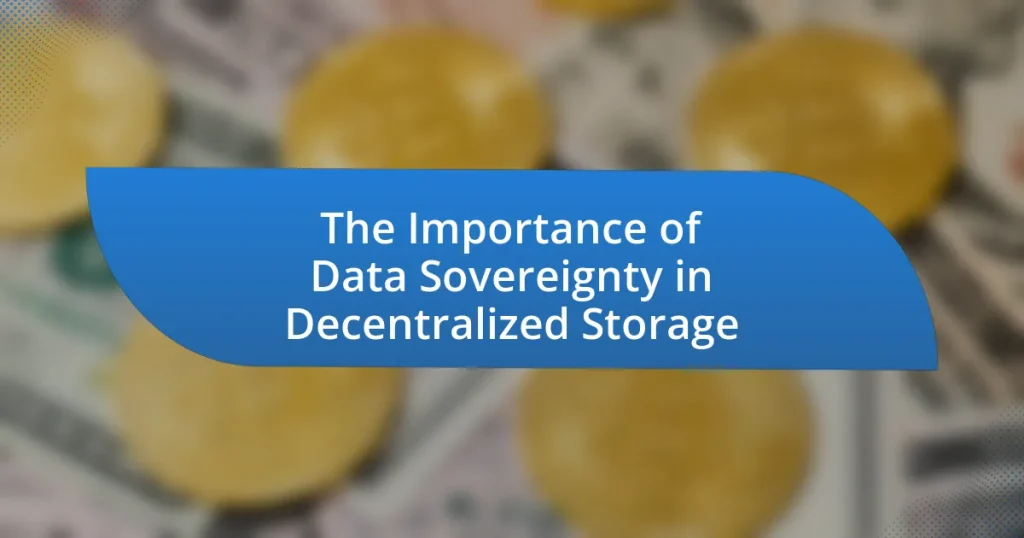Data sovereignty in decentralized storage is the principle that data is governed by the laws of the country where it is stored, ensuring compliance with local regulations such as the General Data Protection Regulation (GDPR) in the European Union. This article explores the significance of data sovereignty, highlighting its role in protecting user privacy, maintaining legal compliance, and enhancing user trust. It addresses the challenges faced in decentralized systems, including technological barriers and varying legal frameworks, while also discussing the implications for data breaches and organizational compliance. Additionally, the article outlines best practices for organizations to implement effective data sovereignty strategies, emphasizing the economic advantages and security measures that arise from adhering to local data governance.
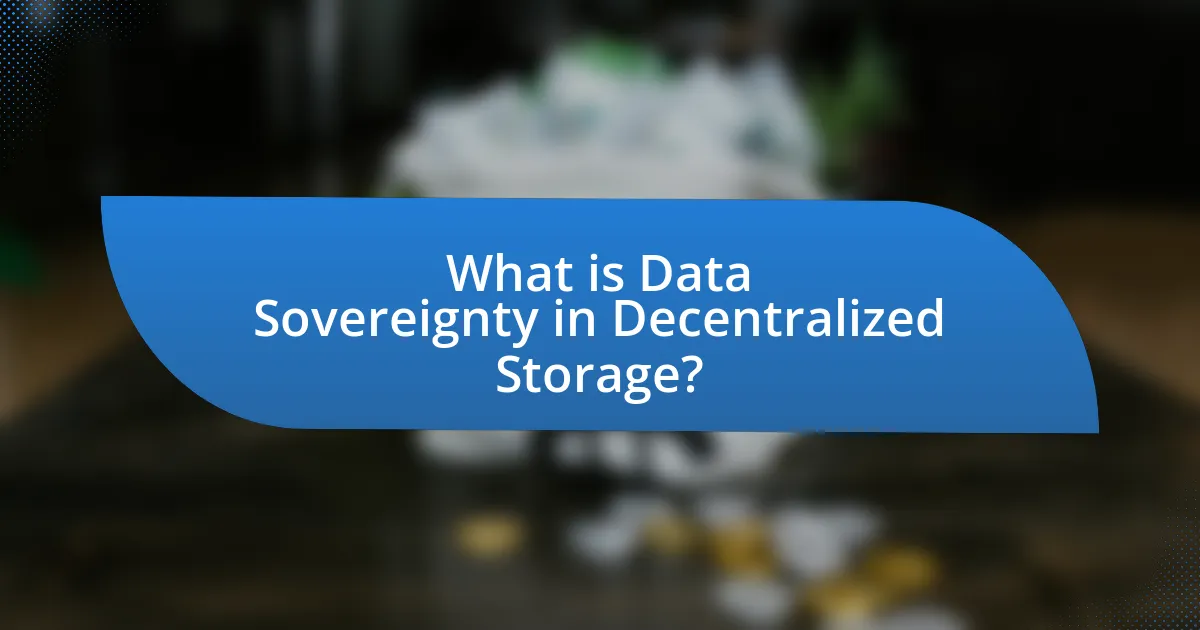
What is Data Sovereignty in Decentralized Storage?
Data sovereignty in decentralized storage refers to the principle that data is subject to the laws and governance of the country in which it is stored. This concept is crucial as it ensures that individuals and organizations maintain control over their data, complying with local regulations such as data protection laws. For instance, the General Data Protection Regulation (GDPR) in the European Union mandates strict guidelines on how personal data is handled, emphasizing the need for data to be stored within the EU to ensure compliance. Thus, data sovereignty in decentralized storage not only protects user privacy but also aligns with legal frameworks, reinforcing the importance of location in data management.
Why is Data Sovereignty important in the context of decentralized storage?
Data sovereignty is crucial in the context of decentralized storage because it ensures that data is subject to the laws and regulations of the jurisdiction in which it is stored. This is particularly important as decentralized storage systems often distribute data across multiple locations, potentially spanning different legal frameworks. For instance, the General Data Protection Regulation (GDPR) in the European Union mandates strict data protection measures, and non-compliance can result in significant fines. Therefore, understanding where data resides helps organizations manage legal risks and maintain compliance with local laws, ultimately protecting user privacy and data integrity.
What are the key principles of Data Sovereignty?
The key principles of Data Sovereignty include the idea that data is subject to the laws and governance structures of the country in which it is collected and stored. This principle emphasizes that individuals and organizations must comply with local regulations regarding data privacy, security, and access. For instance, the General Data Protection Regulation (GDPR) in the European Union mandates strict guidelines on how personal data is handled, reinforcing the concept that data sovereignty is tied to national jurisdiction. Additionally, data sovereignty advocates for the protection of citizens’ rights over their personal information, ensuring that data is not misused or exploited by foreign entities.
How does Data Sovereignty differ from traditional data storage models?
Data sovereignty differs from traditional data storage models primarily in its emphasis on the legal and regulatory control over data based on its geographic location. In traditional data storage models, data can be stored in various locations without regard for local laws, often leading to compliance issues. In contrast, data sovereignty mandates that data must be stored and processed in accordance with the laws of the country where it is located, ensuring that data privacy and protection regulations are adhered to. This is particularly relevant in regions like the European Union, where the General Data Protection Regulation (GDPR) imposes strict rules on data handling. Thus, data sovereignty not only influences where data can be stored but also dictates how it must be managed, ensuring compliance with local legal frameworks.
What challenges does Data Sovereignty face in decentralized storage?
Data sovereignty faces significant challenges in decentralized storage due to the lack of centralized control over data locations and jurisdictions. This decentralization complicates compliance with varying national laws and regulations regarding data protection, as data may be stored across multiple countries with differing legal frameworks. For instance, the General Data Protection Regulation (GDPR) in the European Union imposes strict rules on data handling, which can conflict with the principles of decentralized systems that do not guarantee data residency. Additionally, the difficulty in enforcing legal rights and responsibilities in a decentralized environment can lead to issues in accountability and data ownership, making it challenging for organizations to ensure they meet their legal obligations.
How do legal frameworks impact Data Sovereignty?
Legal frameworks significantly impact data sovereignty by establishing the rules and regulations governing data storage, access, and transfer within specific jurisdictions. These frameworks dictate how organizations must handle data, including compliance with local laws regarding privacy, security, and ownership. For instance, the General Data Protection Regulation (GDPR) in the European Union enforces strict guidelines on data processing and storage, thereby influencing how companies manage data sovereignty by requiring that personal data of EU citizens be stored and processed within the EU or in countries with adequate data protection measures. This legal requirement reinforces the concept of data sovereignty, as it mandates that data remains under the jurisdiction of the local laws, ensuring that individuals’ rights are protected according to the legal standards of their country.
What are the technological barriers to achieving Data Sovereignty?
Technological barriers to achieving Data Sovereignty include inadequate infrastructure, lack of interoperability, and data localization challenges. Inadequate infrastructure refers to the insufficient availability of local data centers and cloud services that comply with national regulations, which hinders the ability to store and process data domestically. Lack of interoperability arises from diverse technologies and standards used across different platforms, making it difficult to ensure seamless data transfer and management while adhering to sovereignty requirements. Data localization challenges involve legal and technical difficulties in ensuring that data remains within specific geographic boundaries, often complicated by global data flows and cross-border regulations. These barriers collectively impede the effective implementation of Data Sovereignty in decentralized storage systems.
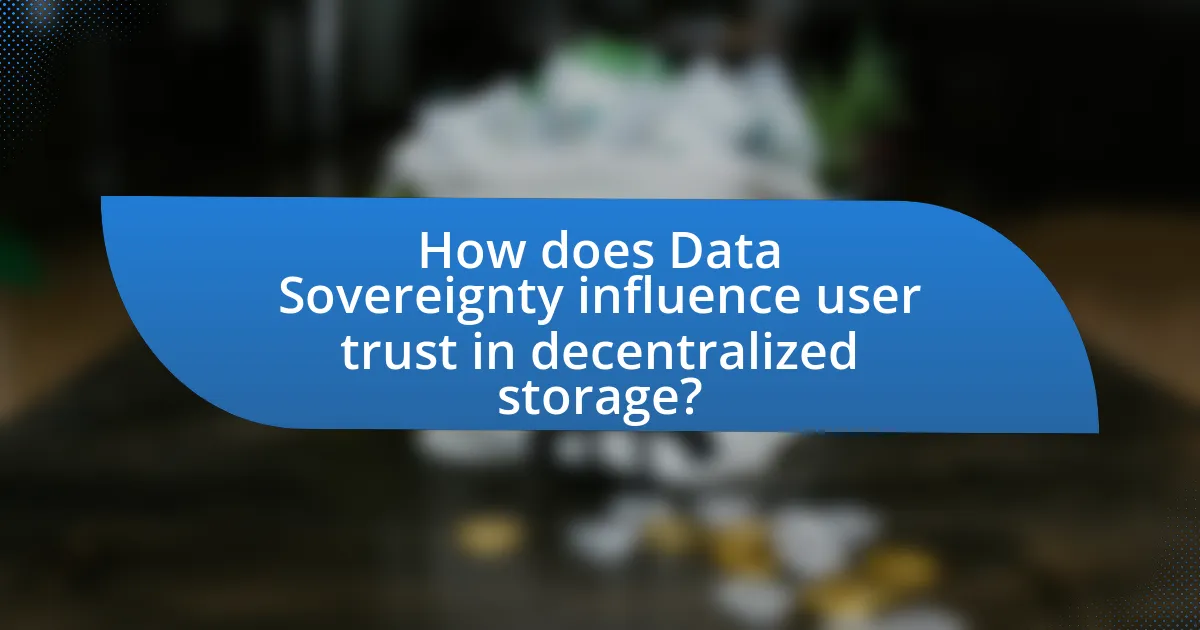
How does Data Sovereignty influence user trust in decentralized storage?
Data sovereignty significantly influences user trust in decentralized storage by ensuring that data is stored and managed according to the legal frameworks of the user’s jurisdiction. When users know their data is subject to local laws and regulations, such as privacy protections and data access rights, they are more likely to feel secure about its handling. For instance, the General Data Protection Regulation (GDPR) in the European Union mandates strict data protection measures, which can enhance user confidence in decentralized storage solutions that comply with these regulations. This legal alignment fosters a sense of accountability and transparency, which are critical components of trust in digital environments.
What role does Data Sovereignty play in data privacy?
Data sovereignty plays a critical role in data privacy by ensuring that data is subject to the laws and regulations of the country in which it is stored. This legal framework protects individuals’ personal information from unauthorized access and misuse, as countries often have specific data protection laws that govern how data can be collected, processed, and shared. For instance, the General Data Protection Regulation (GDPR) in the European Union mandates strict guidelines for data handling, enhancing privacy rights for individuals. By adhering to these regulations, organizations can mitigate risks associated with data breaches and enhance consumer trust, thereby reinforcing the importance of data sovereignty in maintaining robust data privacy standards.
How can Data Sovereignty enhance user control over personal data?
Data sovereignty enhances user control over personal data by ensuring that data is stored and processed according to the laws and regulations of the user’s home country. This legal framework empowers individuals to have greater authority over how their data is used, shared, and protected. For instance, the General Data Protection Regulation (GDPR) in the European Union grants users specific rights, such as the right to access, rectify, and erase their personal data, thereby reinforcing their control. By adhering to local laws, data sovereignty also mitigates risks associated with foreign surveillance and data exploitation, further solidifying user autonomy over personal information.
What are the implications of Data Sovereignty for data breaches?
Data sovereignty significantly impacts data breaches by determining the legal jurisdiction governing data protection and privacy. When data is stored in a specific country, that country’s laws dictate how data breaches are managed, including notification requirements and penalties for non-compliance. For instance, the General Data Protection Regulation (GDPR) in the European Union mandates strict protocols for data breach notifications, requiring organizations to inform affected individuals within 72 hours. This legal framework can lead to more rigorous security measures and accountability for organizations, as they face substantial fines for breaches, which can reach up to 4% of annual global turnover. Thus, data sovereignty not only influences the regulatory landscape but also shapes the operational practices of organizations handling sensitive data, ultimately affecting their risk management strategies in the event of a data breach.
How does Data Sovereignty affect compliance with regulations?
Data sovereignty significantly impacts compliance with regulations by mandating that data be stored and processed within specific geographical boundaries defined by local laws. This requirement ensures that organizations adhere to regional data protection regulations, such as the General Data Protection Regulation (GDPR) in Europe, which imposes strict rules on data handling and privacy. Non-compliance can lead to substantial fines; for instance, GDPR violations can result in penalties of up to 4% of a company’s global revenue. Therefore, understanding and implementing data sovereignty is crucial for organizations to maintain regulatory compliance and avoid legal repercussions.
What regulations are most relevant to Data Sovereignty in decentralized storage?
The most relevant regulations to Data Sovereignty in decentralized storage include the General Data Protection Regulation (GDPR) in the European Union, the California Consumer Privacy Act (CCPA) in the United States, and various national data protection laws. GDPR mandates that personal data of EU citizens must be stored and processed within the EU, reinforcing the concept of data sovereignty. CCPA provides California residents with rights regarding their personal data, impacting how decentralized storage solutions handle user information. Additionally, countries like Brazil have enacted the Lei Geral de Proteção de Dados (LGPD), which aligns closely with GDPR principles, further emphasizing the importance of local data governance in decentralized systems. These regulations collectively shape the legal landscape for data sovereignty, ensuring that data is managed in compliance with local laws.
How can organizations ensure compliance with Data Sovereignty requirements?
Organizations can ensure compliance with Data Sovereignty requirements by implementing data localization strategies that align with local laws and regulations. This involves storing and processing data within the geographical boundaries of the jurisdiction where the data is generated or collected, thereby adhering to specific legal frameworks such as the General Data Protection Regulation (GDPR) in Europe or the California Consumer Privacy Act (CCPA) in the United States. Additionally, organizations should conduct regular audits and assessments to verify compliance, utilize encryption and access controls to protect data, and establish clear data governance policies that reflect the legal obligations of the regions in which they operate.
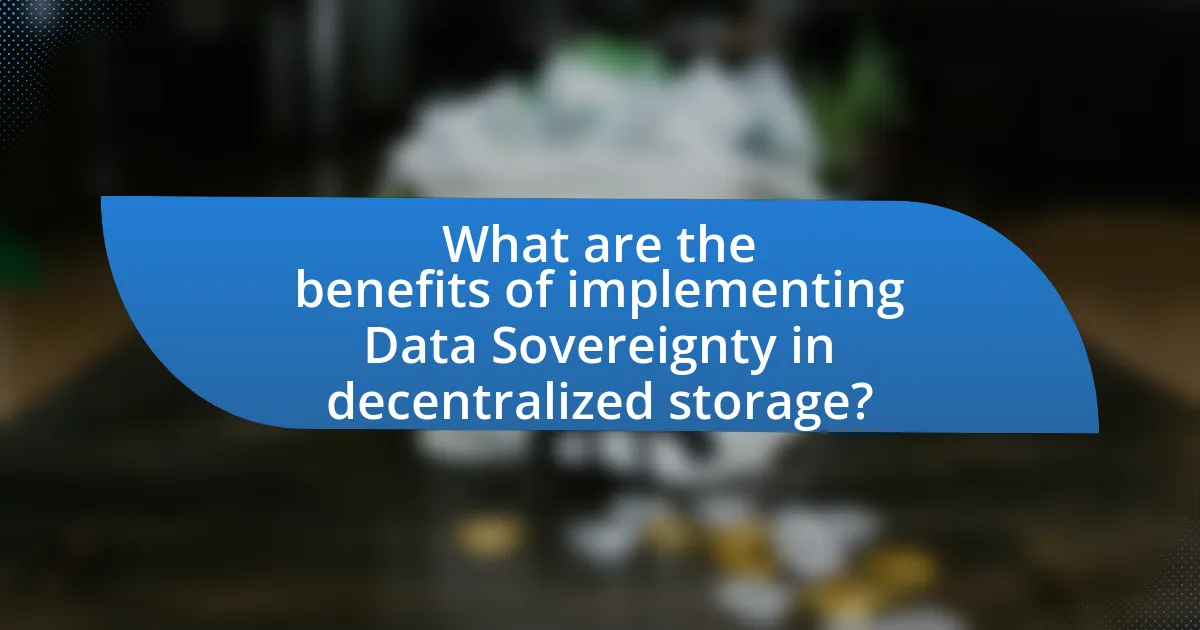
What are the benefits of implementing Data Sovereignty in decentralized storage?
Implementing Data Sovereignty in decentralized storage enhances data control, compliance with local regulations, and user trust. By ensuring that data is stored in accordance with the laws of the jurisdiction where it originates, organizations can avoid legal penalties and ensure that user privacy is respected. For instance, the General Data Protection Regulation (GDPR) in Europe mandates strict data handling practices, and adhering to such regulations through data sovereignty can prevent costly fines, which can reach up to 4% of annual global turnover. Additionally, data sovereignty fosters greater transparency and accountability, as users are more likely to trust systems that guarantee their data is managed according to familiar legal frameworks.
How does Data Sovereignty contribute to data security?
Data sovereignty enhances data security by ensuring that data is stored and processed within the legal jurisdiction of a specific country, which enforces local data protection laws. This legal framework mandates compliance with regulations such as the General Data Protection Regulation (GDPR) in Europe, which imposes strict guidelines on data handling and privacy. By adhering to these regulations, organizations can mitigate risks associated with data breaches and unauthorized access, as local laws often require robust security measures and accountability. Furthermore, data sovereignty limits the exposure of sensitive information to foreign governments and entities, thereby reducing the likelihood of surveillance or data exploitation.
What security measures are enhanced by Data Sovereignty?
Data sovereignty enhances several security measures, including data privacy, compliance with local regulations, and protection against unauthorized access. By ensuring that data is stored and processed within specific jurisdictions, organizations can better adhere to laws such as the General Data Protection Regulation (GDPR) in Europe, which mandates strict data handling practices. This localized control reduces the risk of data breaches and unauthorized surveillance, as data is less likely to be exposed to foreign jurisdictions with different legal standards. Additionally, data sovereignty fosters trust among users, as they can be assured that their information is managed according to the legal frameworks of their own country, thereby reinforcing overall data security.
How does Data Sovereignty mitigate risks associated with data loss?
Data sovereignty mitigates risks associated with data loss by ensuring that data is stored and managed within the legal jurisdiction of a specific country, which provides legal protections and compliance with local regulations. This localized control reduces the likelihood of unauthorized access or data breaches, as data is subject to the laws and regulations that govern its storage and handling. For instance, countries with stringent data protection laws, such as the General Data Protection Regulation (GDPR) in the European Union, impose strict penalties for data loss incidents, thereby incentivizing organizations to implement robust security measures. Additionally, data sovereignty facilitates quicker recovery processes in the event of data loss, as local data centers can respond more efficiently to incidents compared to international entities.
What economic advantages does Data Sovereignty provide?
Data sovereignty provides economic advantages by ensuring that data is stored and processed within a specific jurisdiction, which can lead to reduced compliance costs and enhanced market competitiveness. By adhering to local regulations, businesses can avoid hefty fines associated with data breaches and non-compliance, which can reach millions of dollars. Additionally, data sovereignty can stimulate local economies by encouraging investment in domestic data centers and technology infrastructure, creating jobs and fostering innovation. For instance, the European Union’s General Data Protection Regulation (GDPR) has prompted companies to invest in local data solutions, thereby boosting the economy of member states.
How can businesses leverage Data Sovereignty for competitive advantage?
Businesses can leverage Data Sovereignty for competitive advantage by ensuring compliance with local data regulations, which enhances customer trust and loyalty. By storing data within the jurisdiction where it is collected, businesses can avoid legal penalties and foster a reputation for responsible data management. For instance, companies operating in the European Union must comply with the General Data Protection Regulation (GDPR), which mandates strict data handling practices. This compliance not only mitigates risks but also positions businesses as trustworthy entities in the eyes of consumers, potentially leading to increased market share. Furthermore, businesses can utilize localized data insights to tailor products and services to meet regional preferences, thereby enhancing customer satisfaction and driving sales.
What cost savings can be realized through Data Sovereignty?
Data sovereignty can lead to significant cost savings by reducing compliance and legal expenses associated with data regulations. Organizations that adhere to local data laws avoid hefty fines, which can reach millions of dollars; for example, the General Data Protection Regulation (GDPR) can impose penalties of up to 4% of annual global turnover. Additionally, data sovereignty minimizes the costs related to data transfer and storage across borders, as local data storage eliminates the need for expensive international data transfer solutions. By leveraging local infrastructure, companies can also benefit from lower operational costs, as they avoid the complexities and expenses of managing cross-border data flows.
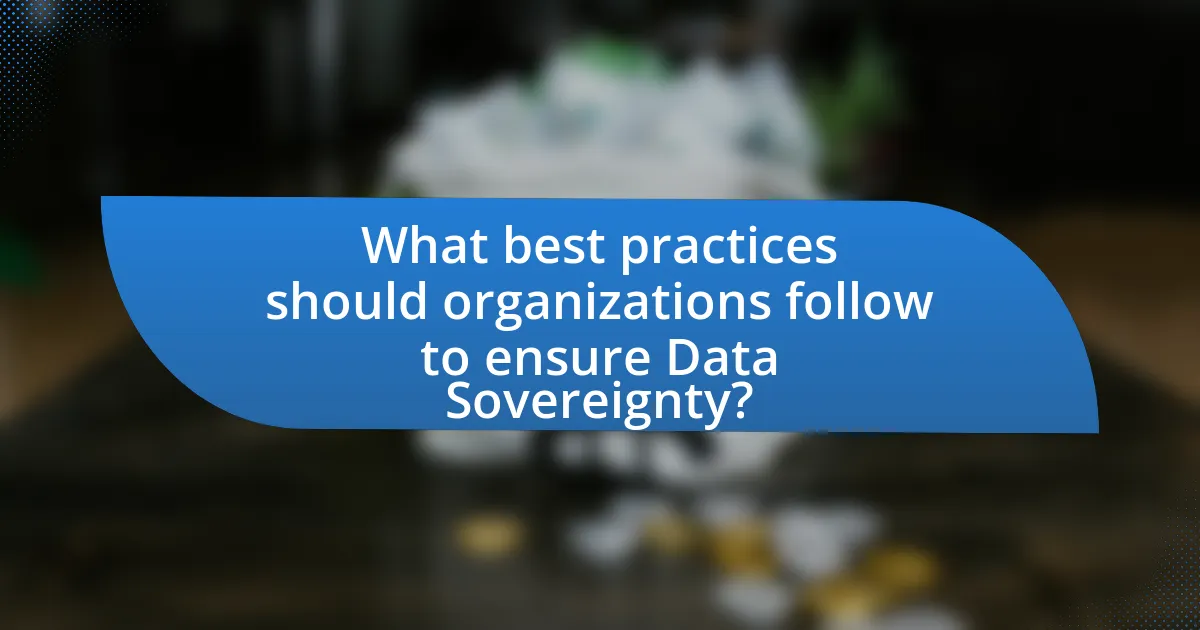
What best practices should organizations follow to ensure Data Sovereignty?
Organizations should implement data localization strategies to ensure data sovereignty. This involves storing data within the geographic boundaries of the jurisdiction where it is generated or where the organization operates. Compliance with local data protection laws, such as the General Data Protection Regulation (GDPR) in Europe, is essential, as it mandates that personal data of EU citizens must be processed and stored within the EU. Additionally, organizations should conduct regular audits to assess data handling practices and ensure adherence to sovereignty requirements. Utilizing encryption and access controls can further protect data integrity and privacy, reinforcing compliance with legal frameworks.
How can organizations implement effective Data Sovereignty strategies?
Organizations can implement effective Data Sovereignty strategies by establishing clear data governance policies that comply with local laws and regulations regarding data storage and processing. This involves conducting thorough assessments of data residency requirements, ensuring that data is stored within the jurisdiction where it is generated, and utilizing local data centers to maintain compliance. For instance, the General Data Protection Regulation (GDPR) in the European Union mandates that personal data of EU citizens must be processed in accordance with EU laws, which necessitates organizations to adopt data sovereignty measures to avoid legal penalties. Additionally, organizations should invest in technologies that enable data encryption and access controls to protect sensitive information while adhering to sovereignty requirements.
What tools and technologies support Data Sovereignty in decentralized storage?
Tools and technologies that support Data Sovereignty in decentralized storage include blockchain, decentralized file storage systems like IPFS (InterPlanetary File System), and encryption technologies. Blockchain provides a transparent and immutable ledger that ensures data integrity and ownership, while IPFS allows for distributed storage across multiple nodes, enabling users to retain control over their data. Encryption technologies further enhance data sovereignty by ensuring that only authorized users can access the stored information, thereby protecting it from unauthorized access. These tools collectively empower individuals and organizations to manage their data in compliance with local regulations and maintain control over their digital assets.
How can organizations educate users about Data Sovereignty?
Organizations can educate users about Data Sovereignty by implementing comprehensive training programs that cover the legal, technical, and ethical aspects of data management. These programs should include workshops, webinars, and informational resources that explain the implications of data sovereignty, such as compliance with local laws and regulations, the importance of data localization, and the risks associated with cross-border data transfers. For instance, the General Data Protection Regulation (GDPR) in Europe mandates strict data handling practices, highlighting the necessity for organizations to inform users about their rights and responsibilities regarding personal data. Additionally, organizations can utilize case studies and real-world examples to illustrate the consequences of non-compliance, thereby reinforcing the importance of understanding data sovereignty in decentralized storage environments.
What common pitfalls should organizations avoid regarding Data Sovereignty?
Organizations should avoid the pitfalls of inadequate understanding of local laws, neglecting data classification, and failing to implement robust data governance frameworks regarding Data Sovereignty. A lack of comprehension of local regulations can lead to non-compliance, resulting in legal penalties; for instance, the General Data Protection Regulation (GDPR) imposes strict rules on data handling within the EU. Neglecting to classify data can result in inappropriate storage solutions that do not meet sovereignty requirements, potentially exposing sensitive information. Furthermore, without a strong data governance framework, organizations may struggle to manage data effectively, leading to risks of data breaches and loss of customer trust.
How can organizations identify and address compliance gaps?
Organizations can identify and address compliance gaps by conducting regular audits and assessments of their data management practices. These audits should evaluate adherence to relevant regulations, such as GDPR or HIPAA, and assess the effectiveness of existing policies and procedures. For instance, a study by the International Association of Privacy Professionals found that organizations that perform regular compliance assessments are 50% more likely to identify gaps in their data handling processes. By implementing corrective actions based on audit findings, organizations can enhance their compliance posture and mitigate risks associated with data sovereignty in decentralized storage.
What are the risks of neglecting Data Sovereignty in decentralized storage?
Neglecting Data Sovereignty in decentralized storage poses significant risks, including legal compliance issues, data privacy violations, and potential loss of control over data. Legal compliance issues arise because different jurisdictions have varying regulations regarding data protection, such as the General Data Protection Regulation (GDPR) in Europe, which mandates strict data handling practices. Failure to adhere to these regulations can result in hefty fines and legal repercussions for organizations. Data privacy violations can occur when data is stored in locations that do not align with the data owner’s privacy expectations, leading to unauthorized access or misuse of sensitive information. Furthermore, potential loss of control over data happens when data is distributed across multiple nodes in a decentralized system, making it challenging to enforce data governance policies and ensuring that data remains within the intended jurisdiction. These risks highlight the critical importance of maintaining Data Sovereignty in decentralized storage solutions.
